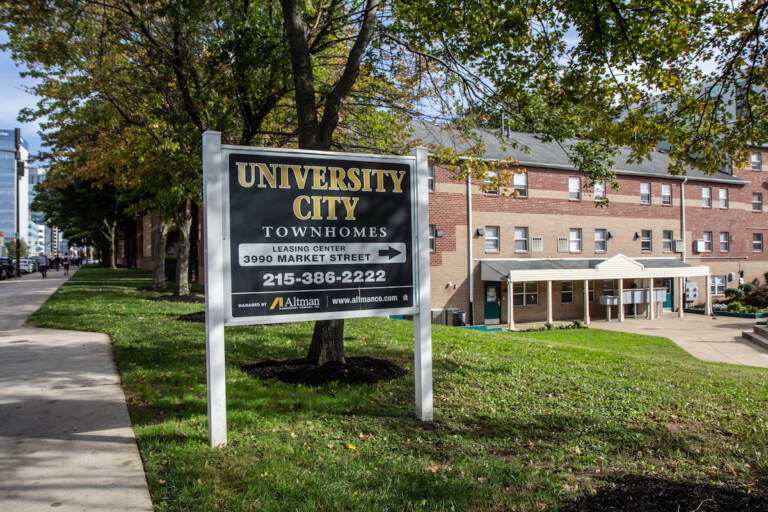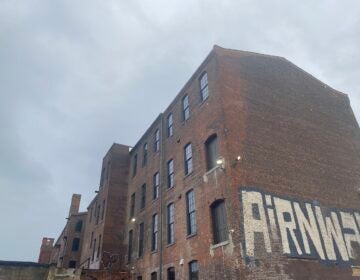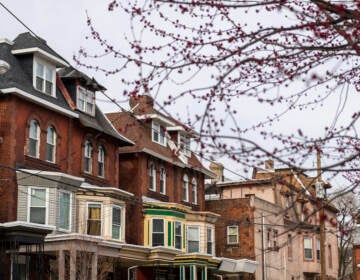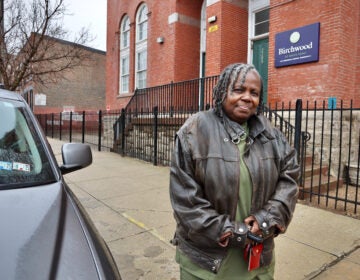Developer filing suit over City Council vote to block sale of affordable rentals in University City
The owner of an affordable rental project in University City wants to sell the property, and is going to court over a just-passed City Council bill to ban the sale.

The University City Townhomes on the 3900 block of Market Street in Philadelphia. (Kimberly Paynter/WHYY)
Following nearly two years of private discussion, a property owner in Philadelphia plans to file a federal lawsuit against City Councilmember Jamie Gauthier, saying the first-term lawmaker has violated its “constitutionally protected right” to sell an affordable housing complex in West Philadelphia.
The decision came hours after Philadelphia City Council passed contested legislation designed to preserve the University City Townhomes, a valuable 70-unit site that went up for sale last summer after IBID Associates declined to renew its affordable housing contract with the U.S. Department of Housing and Urban Development.
“It is clear by her actions that the Councilmember is intent on using the power of her office to punish IBID and prevent it from exercising its constitutional right to sell the property,” IBID spokesperson Kevin Feeley said in a statement.
“Her actions leave the owners with no choice but to initiate federal litigation to protect their constitutional right to sell its property, and to compel her to cease and desist in abusing the powers of her office to prevent them from doing so,” added Feeley.
Gauthier, one of Council’s fiercest affordable housing advocates, learned about the potential lawsuit from WHYY late Thursday afternoon.
Citing the prospect of litigation, she declined to discuss her decision to move forward with the bill, or her recent discussions with the owners about the future of the site.
“We just have to wait and see what happens,” said Gauthier.
Approved in a 15-1 vote, the measure would temporarily bar developers from demolishing the University City Townhomes, which sits in the same swiftly gentrifying section of West Philly that the University of Pennsylvania and Drexel University call home.
The bill, backed by the Philadelphia City Planning Commission, would also rezone the valuable land so developers would be required to build some affordable housing on the site containing the complex. The rents for those units would have to be below the market rate.
“In my eyes, it’s an injustice to simply stand by and watch while low-income people, working class people, and people of color in amenity-rich neighborhoods across our city, neighborhoods that these Philadelphians and their families helped build over generations, are pushed out,” said Gauthier right before Thursday’s vote.
In the same statement, Feeley said the bill’s passage violated the terms of a standstill agreement that had been in place since November — an agreement that “provided the framework for discussions about how to accommodate [Gauthier’s] constantly changing list of demands concerning the site.”
Prior to Thursday’s announcement, IBID said Gauthier rejected a proposal to“effectively replace” the complex’s existing townhomes with new units at the site. Under the plan, those units would be offered to current tenants first if they elected to return after construction was complete.
“The owners remain committed to treating the residents fairly and respectfully, but they will not be subject to threats or intimidation,” said Feeley.
The block-long complex at 39th and Market Streets dates back to the early 1980s, and sits within walking distance from the University of Pennsylvania and Drexel University, drawing attention from real estate companies that focus on developing lab and manufacturing space for life sciences companies, according to the Philadelphia Business Journal. Amid a burgeoning life sciences market, the parcel could sell for up to $100 million, the report said.
With backing from the government, IBID built the low-rise, brick complex with the explicit goal of providing affordable housing in a section of West Philly some still refer to as the Black Bottom. This after the city demolished hundreds of neighborhood homes in the late 1960s and early 1970s to make way for a science and technology campus — what today is known as the University City Science Center.
Like today, the area targeted for redevelopment housed a community of Black families.
Under HUD contracts, tenants have only had to pay 30% of their adjusted household monthly income in rent. Through its Section 8 Housing voucher program, HUD made up the difference between those payments and the full contract rent.
The property owner’s decision not to renew means there’s no longer any obligation to offer subsidized rents at the complex, prompting Gauthier’s bill and rallies organized by supporters of the measure.
As early as October, IBID said it considered Gauthier’s measure to be “little more than illegal ‘spot zoning’ of the site,” raising the possibility then that the legislation could become the source of litigation.
In the meantime, the tenants at the University City Townhomes, many of whom are seniors, must move out by next July, when the current HUD contract expires. The agency has yet to process housing vouchers for any of the complex’s tenants, which can be used to rent apartments across the country, according to a HUD spokesperson.
As the deadline approaches, longtime resident Consuela Astillero is worried she won’t be able to find a new place in her hometown, where she’d like to stay. Landlords in Philadelphia have a history of being resistant to taking on Section 8 tenants. Astillero, whose income is tied to her monthly social security disability check, said her poor credit, as well as an open eviction case, makes her even less appealing to potential landlords.
Even if she finds a place, she can’t lock it down until she has her voucher.
“It’s a disaster,” said Astillero. “It’s just like I’m on hold.”
 WHYY is one of over 20 news organizations producing Broke in Philly, a collaborative reporting project on solutions to poverty and the city’s push towards economic justice. Follow us at @BrokeInPhilly.
WHYY is one of over 20 news organizations producing Broke in Philly, a collaborative reporting project on solutions to poverty and the city’s push towards economic justice. Follow us at @BrokeInPhilly. 
Subscribe to PlanPhilly
WHYY is your source for fact-based, in-depth journalism and information. As a nonprofit organization, we rely on financial support from readers like you. Please give today.








